Some 25 years ago, when websites began to pop up everywhere during the dot-com boom of the 1990s, a friend remarked that launching a new website was like opening a shop in the middle of the desert. How does anyone know it is there? For anyone who has been involved with publishing on the internet, the challenge is not just to create or curate content that is useful to others, but also to ensure that it can be found by those who need it.
Initially, search engines like AltaVista and Yahoo came up with their solutions to deal with this challenge. And then, in 1998, along came Google. With a clean, simple look fronting its PageRank algorithm, it soared to the top. With more than 6 million searches every minute today, Google’s position has seemed unassailable — at least until now. But ever since OpenAI announced the launch of SearchGPT on July 25, I have been wondering what this will mean for the future of search. Equally important, I have been asking myself how this might impact search engine optimization or SEO.
SEO is the art and science of making web pages more attractive to search engines like Google. It’s all about increasing the findability of content and helping a website climb to the top of search results when people look for information related to it. Traditionally, this involved tactics like using specific keywords, building links from other sites, and ensuring that the website loads quickly.
SearchGPT represents a potential shift in this landscape. Unlike Google, which primarily matches keywords and evaluates website authority, SearchGPT aims to understand the intent behind a user’s query and provide direct answers. It is designed to understand natural language more deeply, potentially eliminating the need for users to click through to websites. This fundamental difference could transform how we approach SEO, shifting focus from technical optimizations to creating content that an AI algorithm can easily understand and summarize.
But to return to the question that has been nagging at my mind, what will be the impact of SearchGPT’s technology on the way we search for and find the content we need? How will SEO have to adapt and evolve in this new context?
To answer this question, I turned to four of the most advanced AI systems available today: Gemini, GPT-4o, Bing Chat, and Claude. Each offered its own take on the future of SEO in the age of SearchGPT. As I read their responses, I felt that this was a little like watching four puppies chasing their own tails.
Gemini: The shift to natural language and quality content
Gemini, with its succinct yet insightful analysis, emphasized a fundamental shift in SEO focus. It highlighted three key areas that will become increasingly important:
1. High-quality, informative content that AI can easily understand and summarize
2. Semantic relevance and structured data to help AI interpret and rank content accurately
3. Natural language optimization for conversational queries
Gemini’s perspective suggests that the days of keyword stuffing and other traditional SEO tactics may be numbered. Instead, content creators will need to focus on producing clear, informative articles that directly address user needs and questions.
GPT-4o: A holistic approach to SEO
GPT-4o offered a comprehensive view of how SearchGPT might reshape SEO, outlining 10 key areas of impact. At the heart of its analysis was a shift towards more nuanced, user-centric optimization strategies. GPT-4o emphasized the move from traditional keyword-focused approaches to a deeper understanding of natural language processing. This means that instead of simply targeting specific words or phrases, SEO professionals will need to optimize for the context and intent behind users’ questions. The AI also highlighted the growing importance of user experience and engagement metrics, suggesting that factors like dwell time, bounce rate, and overall user interaction with content will play a more significant role in search rankings.
Dwell time is a concept in SEO that’s becoming increasingly important, especially as search engines like SearchGPT become more sophisticated in understanding user behavior. Imagine you’re browsing through a bookstore. You pick up a book, flip through its pages, and spend some time reading the first chapter. The amount of time you spend with that book before putting it back on the shelf or deciding to buy it is similar to what we call dwell time in the digital world.
In SEO terms, dwell time refers to the length of time a user spends on a web page after clicking on it in search results, before returning to the search engine results page. It’s like a digital vote of confidence. If a user clicks on your website from a search result and stays there for a while, reading your content or engaging with your page, it signals to search engines that your content was relevant and valuable to the user’s query.
A longer dwell time generally suggests that the content was useful or interesting to the reader. On the flip side, if someone clicks on your page and immediately hits the back button (we call this a “bounce”), it might indicate that the content wasn’t what they were looking for.
Gemini’s perspective suggests that the days of keyword stuffing and other traditional SEO tactics may be numbered.
Another crucial aspect of GPT-4o’s analysis was the increased emphasis on content depth and relevance. It suggested that SearchGPT will favor detailed, well-researched, and authoritative content that comprehensively covers topics. This aligns with the growing importance of E-A-T (Expertise, Authoritativeness, and Trustworthiness) in SEO. GPT-4o also pointed out the need for technical adaptations, such as implementing structured data and schema markup to help AI better understand and categorize content.
When GPT-4o mentions schema markup, it’s referring to a specific way of organizing information on a website to make it easier for search engines to understand. Think of schema markup as a kind of digital labeling system or a special language that helps search engines categorize and interpret the content on your web pages.
For example, if you have a recipe on your website, schema markup allows you to clearly tag different elements like the ingredients, cooking time, nutritional information, and user ratings. This structured approach helps search engines recognize that this content is a recipe, rather than just a random collection of text and numbers. As a result, your recipe might appear in search results with additional information like a star rating or cooking time, making it more attractive and informative to users.
In the context of SearchGPT and evolving SEO practices, schema markup becomes even more crucial. It helps AI-powered search engines like SearchGPT to quickly and accurately understand the content and context of your web pages. This could potentially lead to better positioning in search results and more informative snippets displayed to users. As search engines become more sophisticated in understanding natural language, providing this clear, structured data through schema markup can give your content an edge in visibility and relevance.
The final point that GPT-4o stressed was the importance of optimizing for voice search and conversational queries, reflecting the changing ways users interact with search engines. GPT-4o’s view led me to think of SEO evolving into a more holistic discipline, requiring a blend of technical expertise, high-quality content creation, and a deep understanding of user behavior.
Bing: The evolution of content and authority
Bing’s analysis, while overlapping with some points from Gemini and GPT-4o, brought additional focus to the importance of authority and credibility in content. The key takeaways from its response include the following:
1. A stronger emphasis on high-quality, relevant content that thoroughly answers user queries
2. Prioritizing user intent and experience in content creation
3. The increasing value of authoritative and well-cited content
4. The need for SEO professionals to stay updated with AI trends and adapt continually
Bing’s perspective highlighted the importance of establishing expertise and trust in your field. This resonated with my own experience of rebuilding my professional identity after my stroke. Just as I had to reestablish my credibility as a writer and editor, websites and content creators will need to prove their authority to AI-powered search engines.
Claude: Adapting to AI-powered search
Claude’s analysis provided a more cautious and speculative approach, acknowledging the uncertainties surrounding SearchGPT’s specific capabilities. However, it offered valuable insights into potential SEO adaptations based on general AI and search trends:
1. Focusing on user intent and context in content creation
2. Prioritizing truly valuable, in-depth content over keyword-focused strategies
3. Emphasizing semantic SEO and structured data
4. Optimizing for voice search queries
5. Adapting to potential changes in search engine results pages (SERPs)
Synthesizing the insights: A new era of SEO
As I reflected on the perspectives offered by these four AI systems, I began to see a clearer picture of how SearchGPT might reshape SEO. The common threads running through their analyses point to a future where:
1. Content quality reigns supreme: All four AI systems emphasized the importance of creating high-quality, informative content that directly addresses user needs. The days of churning out thin, keyword-stuffed articles are truly behind us.
2. Understanding user intent is crucial: SEO professionals will need to become adept at anticipating and addressing the underlying motivations behind user queries, rather than simply targeting specific keywords.
3. Technical SEO evolves: While traditional technical SEO factors like site speed and mobile-friendliness remain important, there will be a greater emphasis on structured data, schema markup, and other methods to help AI systems better understand and categorize content.
4. Adaptability is key: The rapid evolution of AI-powered search will require SEO professionals to stay informed about the latest developments and be willing to experiment with new strategies.
5. Ethical practices become more important: As AI systems become better at detecting manipulative tactics, there will be an even stronger emphasis on white-hat SEO techniques and genuine value creation.
As I pondered these insights, I couldn’t help but draw parallels to my own journey of relearning how to write after a stroke. Just as I had to adapt to new tools and methods, embracing AI assistance while still maintaining my human touch, SEO professionals will need to find the right balance between leveraging AI capabilities and preserving the human elements that make content truly engaging and valuable.
The future of search may be AI-driven, but it will still be shaped by human creativity, empathy, and ingenuity.
The road ahead for SEO in the age of SearchGPT may seem daunting, but it’s also filled with exciting possibilities. By focusing on creating genuinely helpful, high-quality content and staying attuned to the evolving needs of both users and AI systems, marketers and content creators can continue to thrive in this new environment.
As we stand on the brink of this new era in search, I’m reminded of the resilience and adaptability of the human spirit. Just as I found new ways to express myself and reconnect with my profession after my stroke, the SEO community will undoubtedly rise to the challenges and opportunities presented by SearchGPT. The future of search may be AI-driven, but it will still be shaped by human creativity, empathy, and ingenuity.
So, to all the curious minds out there wondering about the future of SEO, I say embrace the change, stay curious, and never stop learning. The adventure is just beginning.

